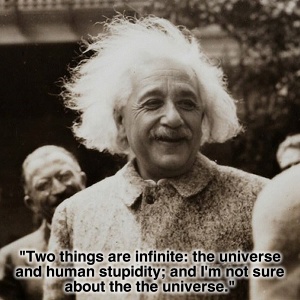Happily, we turn to the “causes of happiness” in SOL today. Part Two of Russell’s Conquest (here at a nifty Japanese site, replete with quirky illustrations) accentuates the positive. Good, I’ve had more than enough competition (but *Go Cards!), boredom, fatigue, envy, sin, and public opinion.
For starters, he says, talk to your gardener. So I did. My wife is definitely happier than average, and more in touch with the roots of life. (They love her at Moore & Moore.) Like Russell’s gardener she enjoys defeating rabbits and other garden scourges. “Pleasures exactly similar to those of my gardener are open to the most highly educated people.” Mine too. She’s among them, in fact.
Then there’s a curious discussion of the “men of science” that tells us something of how far we’ve fallen in the 80+ years since Russell was able to generalize from Einstein. Scientific men and women nowadays have Michelle Bachman and Rick Perry and their ilk to contend with. “Very few can be genuinely happy in a life involving continual self-assertion against the skepticism of the mass of mankind.” Right. How would Uncle Albert have responded to the war on science waged by our climate skeptics and Young Earth creationists?
able to generalize from Einstein. Scientific men and women nowadays have Michelle Bachman and Rick Perry and their ilk to contend with. “Very few can be genuinely happy in a life involving continual self-assertion against the skepticism of the mass of mankind.” Right. How would Uncle Albert have responded to the war on science waged by our climate skeptics and Young Earth creationists?
Or, with more verbal articulation (and bigger hair):
Some more noteworthy Russellian wisdom:
The pleasure of work is open to any one who can develop some specialized skill, provided that he can get satisfaction from the exercise of his skill without demanding universal applause.
Companionship and cooperation are essential elements in the happiness of the average man…
Belief in a cause is a source of happiness… I cannot advocate any happiness based upon what seem to me to be false beliefs… [but a worthy cause is] a complete antidote to the feeling that life is empty.
Any pleasure that does no harm to other people is to be valued.
*Consider the passionate joy of the baseball fan…
Fundamental happiness depends more than anything else upon what may be called a friendly interest in persons and things.
To like many people spontaneously and without effort is perhaps the greatest of all sources of personal happiness.
The secret of happiness is this: let your interests be as wide as possible , and let your reactions to the things and persons that interest you be as far as possible friendly rather than hostile.
The most universal and distinctive mark of happy men [is] zest.
Russell has been cadging from William James, for whom life becomes most “significant” when we locate ideals outside ourselves that elicit our greatest energies and ambitions. The solid meaning of life is a “marriage” of such ideals with “some fidelity, courage, and endurance; with some man’s or woman’s pains.”
With “zest” Russell makes his indebtedness to James nearly explicit.
The lustre of the present hour is always borrowed from the background of possibilities it goes with… Let faith and hope be the atmosphere which man breathes in;—and his days pass by with zest.
“Zest” is one of James’s favorite words, charged with the vibrancy of experience not as a metaphysical category but the felt movement of life as literal inspiration, something to draw in and express through all the pores of one’s being.
Zest seems to be one of Russell’s favorite words too, earning an entire chapter of its own. Remember the first time he mentioned it? You couldn’t miss the echo of James there. (I can’t, anyway.)
I believe this unhappiness to be very largely due to mistaken views of the world, mistaken ethics, mistaken habits of life, leading to destruction of that natural zest and appetite for possible things upon which all happiness, whether of men or animals, ultimately depends.
More zest from Russell:
What hunger is in relation to food, zest is in relation to life.
Genuine zest is part of the natural make-up of human beings… Young children are interested in everything that they see and hear; the world is full of surprises to them, and they are perpetually engaged with ardour in the pursuit of knowledge, not, of course, of scholastic knowledge, but of the sort that consists in acquiring familiarity with the objects that attract their attention.
Animals, even when adult, retain their zest provided they are in health.
Russell was a notorious advocate of “free love,” a serial philanderer whose passions knew no bounds. He sought zest in varied “affection”… and in family life. He saw no contradiction. Do we?
Tags: Bertrand Russell, William James

Leave a comment